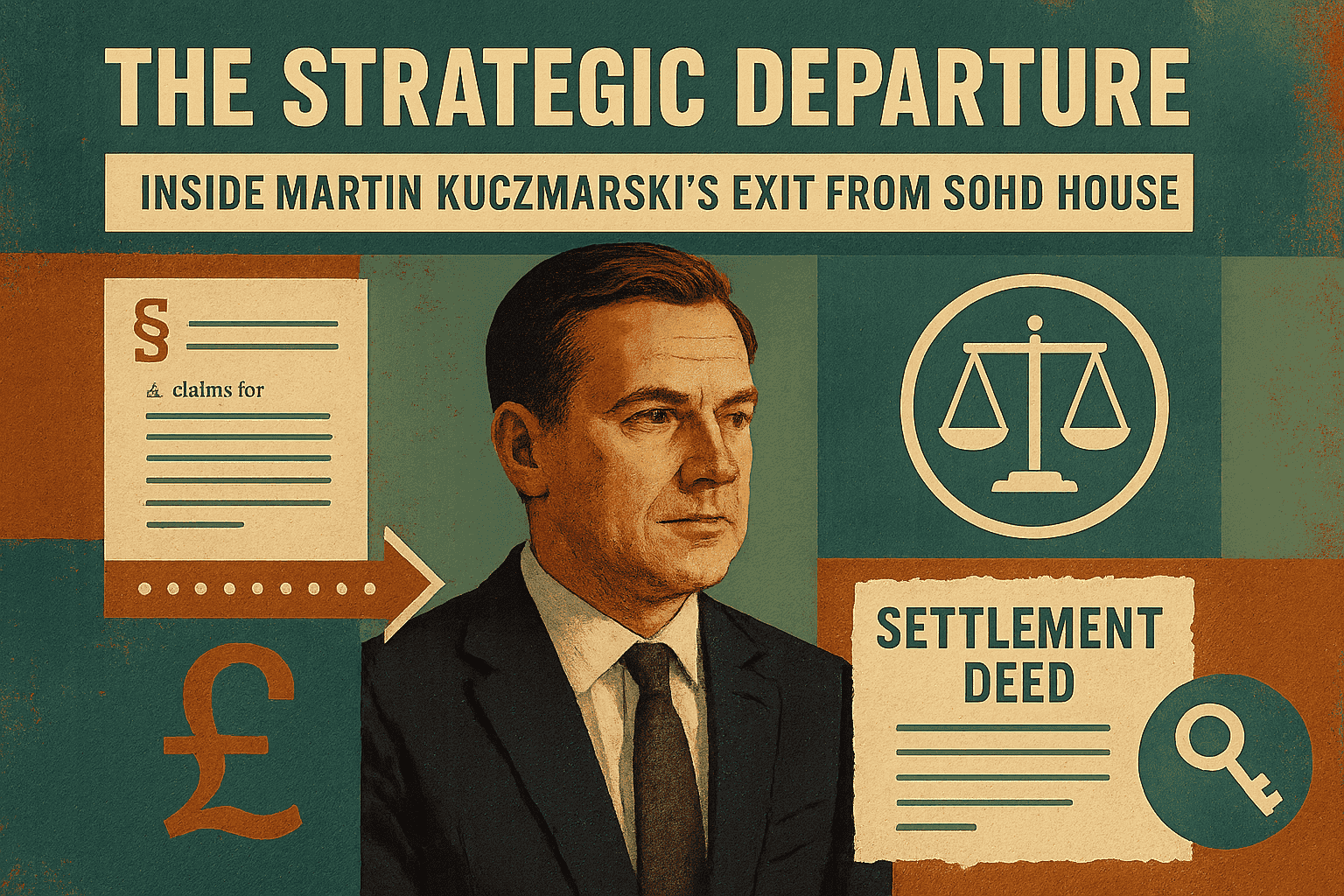The Strategic Departure: Inside Martin Kuczmarski's Exit from Soho House
Explore the intricacies of Martin Kuczmarski's departure from Soho House as COO, marked by a meticulously crafted Settlement Deed. Discover how this legal arrangement ensures the protection of proprietary knowledge and smooth transition of responsibilities.

The COO Exit Strategy: Analyzing the Martin Kuczmarski Settlement Deed
A Soho House Insider Legal Editorial
The business of global exclusivity requires robust legal choreography, especially when a key executive departs. The exit of Martin Kuczmarski, the Group's long-serving Chief Operating Officer (COO), was concluded not with a dramatic firing, but with a highly structured and legally airtight Settlement Deed. This resolution, finalized on September 28, 2022, with Soho House UK Limited ("Soho UK"), offers a detailed look into how Soho House & Co Inc. (SHCO) manages high-level employment risk and safeguards its proprietary knowledge.
The Corporate Context: Eliminating the COO Role
Mr. Kuczmarski was a foundational figure in the Group, joining Soho House in 2008 as the General Manager of Electric House and advancing to COO in January 2012. He previously [1] held roles at prestigious luxury establishments like The Ritz in Paris and Four Seasons in Milan. His departure, announced on September 23, 2022, was explicitly tied to the elimination of the Chief Operating Officer role, with his responsibilities being absorbed by the existing regional operations leadership team, including President Andrew Carnie.
This required a clean [2] [2], legally binding break from his existing service agreement, which provided for a substantial annual base salary of £800,000 and participation in a bonus scheme with a maximum opportunity of 200% of his base salary. The Settlement [3] [4] Agreement with Soho House UK Limited included a waiver of his rights to notice or any payment in lieu for three months of his total six-month contractual notice period, with a payment of £200,000 for the remaining notice period. [5] [6]
The Financial Resolution: Cash, Waivers, and Equity Vesting
The Settlement Agreement was meticulously engineered to resolve all outstanding claims while using sophisticated compensation mechanisms.
1. Contractual Notice and Cash Settlement
Mr. Kuczmarski's employment agreement stipulated a six-month written notice period. Under the Settlement Agreement, he agreed to waive his rights to notice or payment in lieu for three months of this contractual period. In exchange for the waiver and acceptance of the Deed's terms, Soho UK paid him a fee of £200,000, representing the remaining three months' contractual notice period.
Crucially, as part of the settlement [7], Mr. Kuczmarski acknowledged that he had no entitlement to any discretionary bonus awards for the performance year 2022 or any subsequent performance years.
2. Equity as a Retention Tool [7]
The deal leveraged equity to incentivize a smooth, compliant departure. His previously granted equity awards—specifically 401,845 Restricted Stock Units (RSUs) and 260,577 Restricted Stock Awards (RSAs)—had their unvested portions amended to vest in four equal installments between October 1, 2022, and April 1, 2023.
Furthermore, as specific [7] consideration for entering the Settlement and Consulting Agreements, Mr. Kuczmarski was granted a new RSU award of 365,000 shares of Class A Common Stock. This new equity was scheduled to vest in two halves in July 2023 and October 2023. These payments were strictly subject to Mr. Kuczmarski's continued compliance with certain restrictive covenants. [7]
Legal Waivers and Protecting Corporate Assets
The core purpose of the Settlement Deed was to prevent future legal action. Mr. Kuczmarski formally agreed not to pursue legal claims related to his employment or its termination. The waived claims specifically included:
- Claims for breach of contract or wrongful dismissal.
- Claims for unfair dismissal under section 111 of the Employment Rights Act 1996.
- Claims regarding unlawful deduction from wages.
- Claims for a statutory redundancy payment.
Beyond the waivers [8], the agreement secured the company's vital interests through long-term restrictions:
- Confidentiality and IP: His obligations regarding confidentiality, data privacy, and intellectual property continued to apply.
- Non-Compete/Non-Solicit [9]: His post-termination non-competition restrictions and non-solicitation restrictions remain in force. The covenants related to the non-solicitation and employment of key staff were agreed to apply for three years from the effective date.
- The £1 Consulting Agreement [10]: To ensure ongoing availability for support and compliance during the transition, Mr. Kuczmarski entered into a Consulting Agreement for a twelve-month term, for a fee of just £1.
This comprehensive Deed [9] demonstrates SHCO's commitment to insulating itself from employment litigation and ensuring that high-level operational knowledge and relationships remain protected, regardless of the cost of the executive exit package. It marks a classic maneuver where significant financial consideration—especially in the form of accelerated equity—is traded directly for the peace of mind afforded by sweeping legal waivers and strict restrictive covenants. [9]
References
Legal Disclaimer
The information in this article/post is provided for educational, commentary, and criticism purposes only, drawing from publicly available sources under fair use principles. No intentional effort has been made to infringe trademarks, cause confusion, or exploit Soho House's goodwill for commercial gain. This site is non-commercial and operated in good faith as an independent resource. If you believe any content is inaccurate, infringing, or otherwise disputed, please contact us via the contact form for prompt review and potential resolution. We are not affiliated with Soho House.